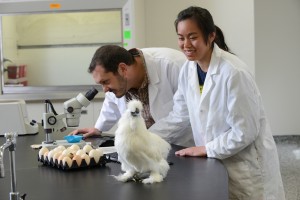 Poultry Science teaches people how to raise and manage healthy chickens, turkeys, and ducks for eggs or meat. Students learn to apply principles of biology and chemistry to improve productivity. They study animal nutrition and food science. In addition to providing an excellent source of nutritious food, poultry research has also made significant contributions to our understanding of many basic principles of biology. Advances in human nutrition, genetics, immunology, developmental biology, toxicology, biotechnology, and health have often been made possible by the use of avian models.
Poultry Science teaches people how to raise and manage healthy chickens, turkeys, and ducks for eggs or meat. Students learn to apply principles of biology and chemistry to improve productivity. They study animal nutrition and food science. In addition to providing an excellent source of nutritious food, poultry research has also made significant contributions to our understanding of many basic principles of biology. Advances in human nutrition, genetics, immunology, developmental biology, toxicology, biotechnology, and health have often been made possible by the use of avian models.
For example, many of our human vaccines were developed in chick and duck embryo systems. Much of what we know about the human immune system was first described using avian models. Likewise, most of the vitamins were first discovered as an offshoot of poultry nutrition studies. Either as a source of protein or as a basic avian research or human biomedical model, poultry serves as a valuable contributor to human wellbeing.
Courses include:
Evaluation of Live Poultry, Introduction to HACCP (Hazard Analysis and Critical Control Points System), Avian Physiology, Production and Management of Game Birds in Confinement, Comparative Nutrition, Turkey Production, Commercial Egg Production, Incubation and Hatchery Management, Feed Mill Management and Feed Formulation, Poultry Breeding
| College | |
| Discipline |
|
| Academic Department | |
| Departmental Contact | |
| Major Overview | |
| Plan Requirements | |
| Semester Sequence | |
| Related Majors | |
| Minors | |
| Skills You Could Develop |
|
| Learn More About This Major | |
| Career Titles | |
| Learn More About Careers |